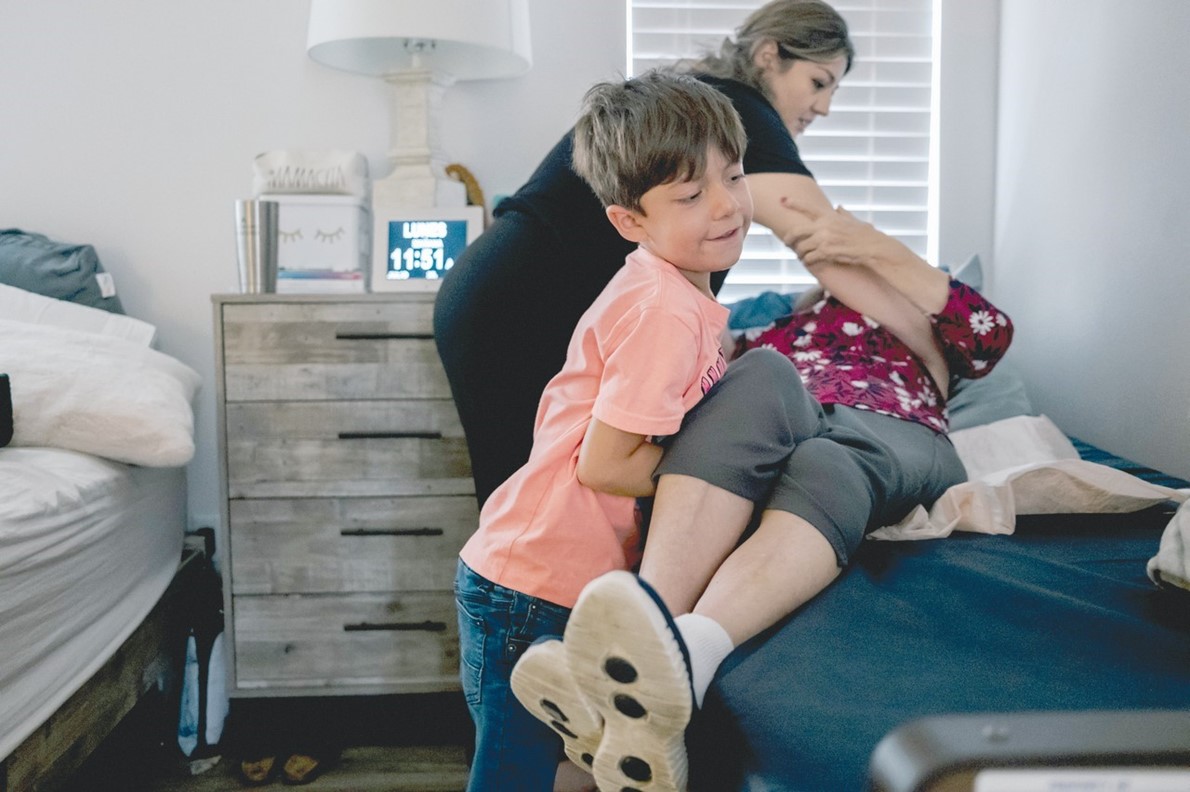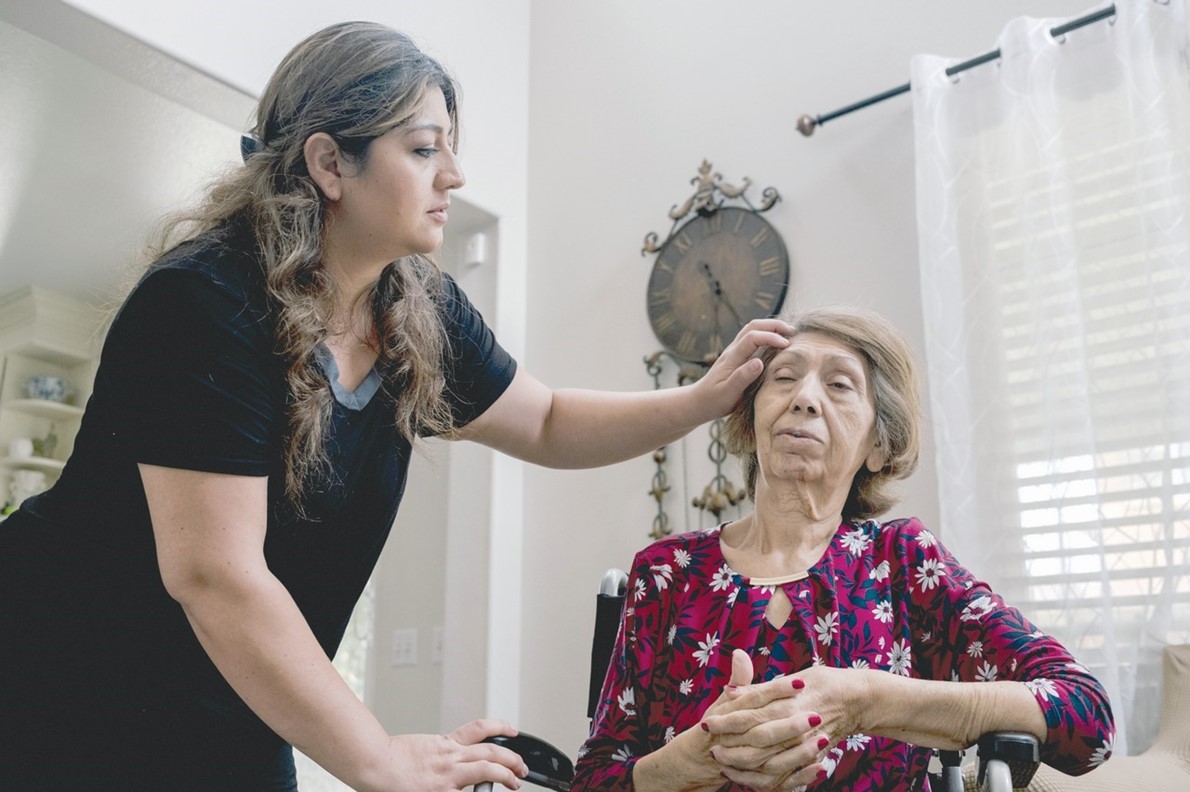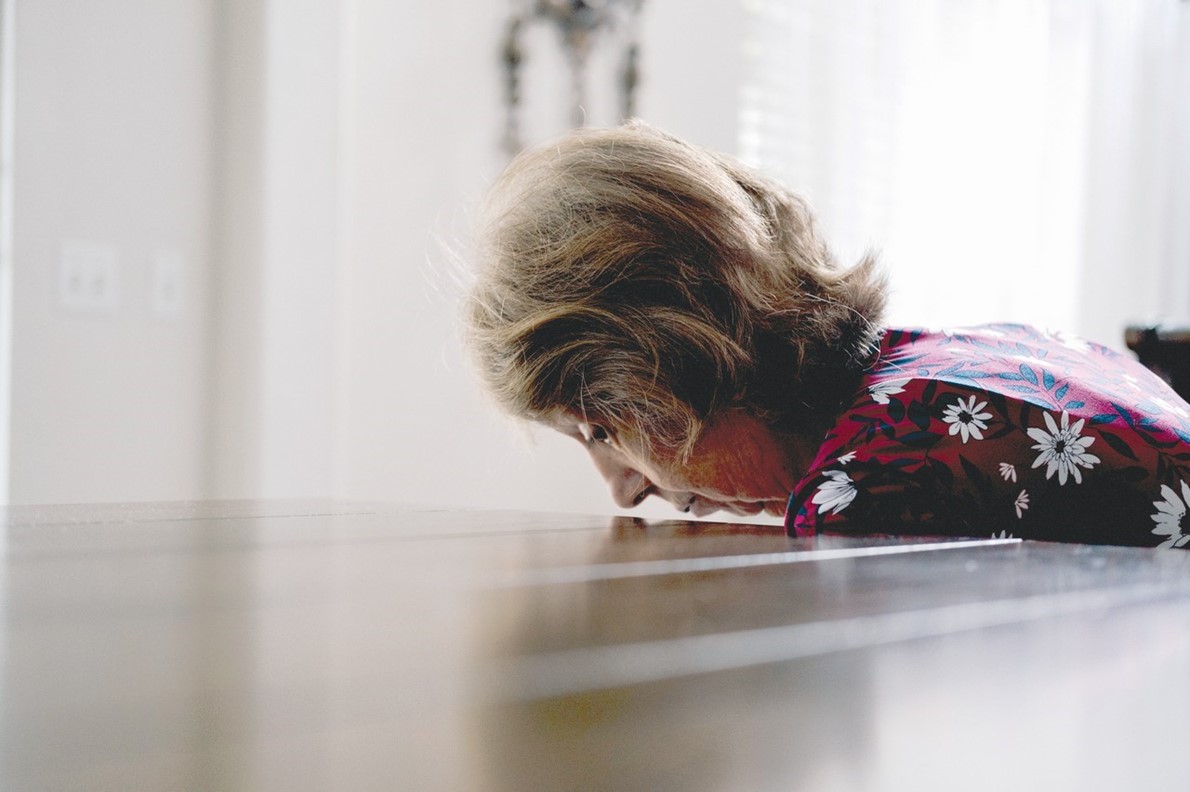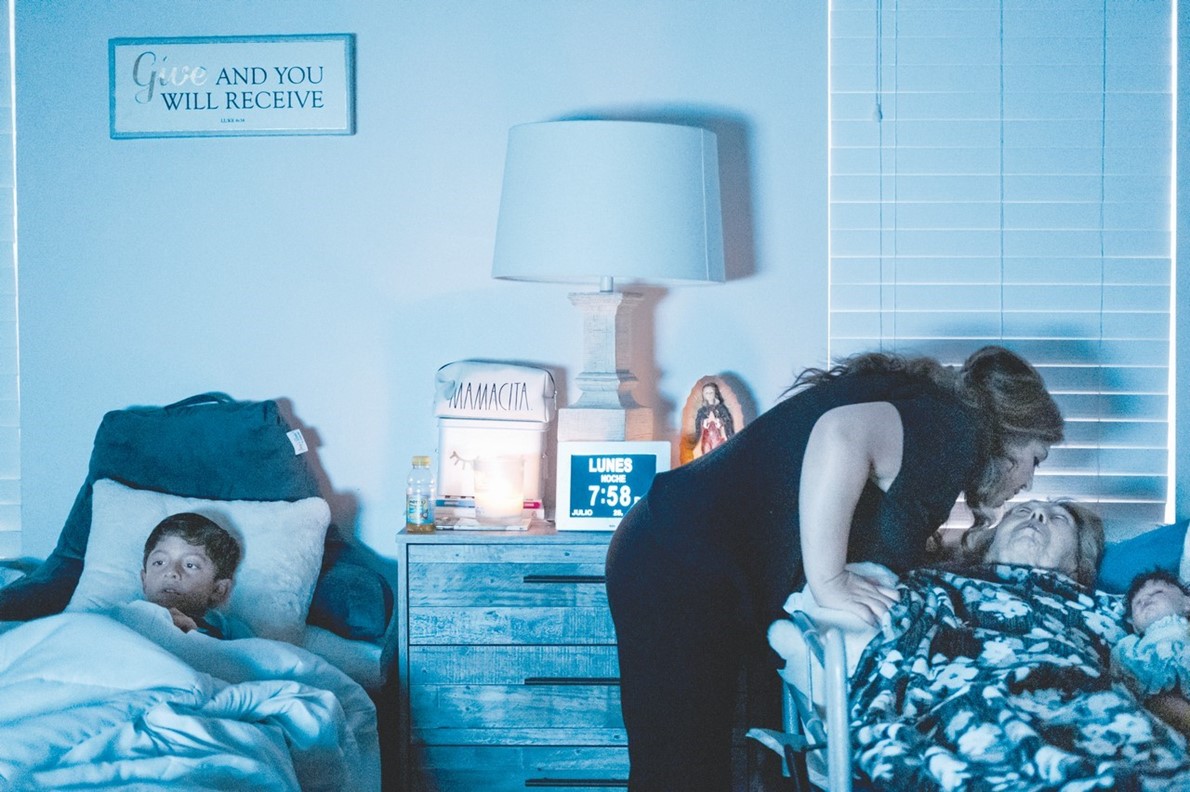‘What if this is my destiny?’
Children of Alzheimer’s patients sometimes fear future diagnosis
New York Times
last updated: Aug 16,2022

At
school pickup, Janet Perez always looks for the neon orange backpack that makes
her 6-year-old son, Jayden, so easy to spot. But on a recent spring afternoon
in Perris, California, she could not find him. Her first response was primal:
Someone had kidnapped him. Then she tried to remember what he had been wearing
and realized she was not sure if she had dropped him off that morning. A
familiar dread washed over her: Was it happening? Was her forgetfulness an
early sign that she had her mother’s illness, Alzheimer’s disease?اضافة اعلان
Ten long minutes after she arrived at school, Jayden appeared. He had been in the bathroom. Perez then remembered that her sister had brought him to school that morning; she had been watching their mother.
Even though a nurse practitioner has since attributed her memory lapses to stress, the fear of forgetting looms large over Perez. “What if this is my destiny, and this is what’s going to happen to me?” she asked on a recent morning as she sat beside her mother, Rita Perez, with whom she has lived since 2019. Janet Perez began caring for her after the 74-year-old widow started leaving her stove burners on and grew so paranoid that she was barricading her bedroom door with a chair. Since then, the family has watched Rita Perez, a woman who once owned a beauty salon, steadily lose the ability to do her own hair or brush her own teeth. In a wheelchair much of the time, she no longer recognizes Janet Perez, or her four other children.

Janet Perez, 35, would be an extremely young person to have Alzheimer’s — in most cases, symptoms appear after age 65 — and no one else in her large Mexican American family has the condition. Still, she knows the impact of dementia, an umbrella term for many illnesses that cause the deterioration of brain function, in her community. It afflicts Hispanic older adults nearly twice as often as their white counterparts, according to a recent study in JAMA, the influential medical journal.
With her mother’s decline, and her own memory lapses, Perez often lies awake at night circling around what is, for her, the darkest thought of all: What if, one day soon, she forgets who Jayden is?
In the US, Alzheimer’s disease affects 6.5 million adults over 65 years old; by 2050, that figure is projected to nearly double, according to the Alzheimer’s Association, the leading advocacy organization for those with the disease.
But thanks to expanded awareness of the illness, the most common form of dementia, it regularly ranks in consumer polls as one of the most feared diseases. Among relatives who have watched the disease’s progression in a loved one, the perceived threat can be even greater, research has shown. In some cases, they became hypervigilant about monitoring their own memories, each forgotten name or lost set of keys seemingly a sign of something more serious.
Shannon Spindler, a 47-year-old library assistant whose father has the disease, which killed his own father, started to cry recently when she misplaced a book. “Oh, dear God, is it coming for me?” wondered the Springfield, Missouri, resident.

Mark Applegate, now 51, notes growing closer to 65 — the age when his mother was diagnosed — every birthday. She is now in hospice, sleeping most of the time. While Applegate, an IT director from Bolivar, Missouri, is not thinking about Alzheimer’s constantly, “it’s in the back of my mind that it’s already in the process for me,” he said.
For Amber Barber of Lebanon, Oregon, it’s the image of her 77-year-old father on his deathbed last year that haunts her, as does her fear that she will be next. “I don’t have memory problems, but the scary thing for me was watching how fast he went,” said Barber, 46, a program management director at a software consulting company. She added, “I don’t want to have my kids watch me starve to death.”
Certainly not everyone with a family history of Alzheimer’s lives in fear. But for those who do, the worry can be overwhelming. Cristiane Passarela, a licensed mental health counselor at NYC Cognitive Therapy, has seen clients hyperventilate with the worry that they have the same disease as a relative. “The worst is when they come to us and they cannot function,” she said.
When people report suffering from worsening memory, and tests do not reveal deterioration, the complaints are collectively referred to as subjective cognitive decline. These self-reported symptoms can be early signs of Alzheimer’s disease, but long-term follow-up suggests that, a lot of the time, they are not.
Still, some fear can be beneficial. Concern has driven many family members to get assessed. It has also inspired lifestyle changes, like becoming more physically and cognitively active, that have been associated with reduced risk for decline.
“You get the people who reframe their fear into a positive by doing lifestyle activities that may be a benefit to them,” said Dr David Wolk, professor of neurology at the University of Pennsylvania and director of the Penn Alzheimer’s Disease Research Center.

But fear can also make it harder for currently healthy people to enjoy their lives right now. How do you live well despite what may — or may not — be to come?
Do not overestimate your own risk
People who have at least one close relative with Alzheimer’s have a higher risk of dying from the condition, according to a study that examined residents of Utah using a genealogy database. Still, the majority of people with a family history of Alzheimer’s will not develop the disease.
Genetics play a more significant role for those with early-onset familial Alzheimer’s, also referred to as dominantly inherited Alzheimer’s. This form of the disease affects only 1 percent to 2 percent of the general population, and generally appears before age 65. Children with a parent who carries the gene defect responsible for it have a 50 percent chance of inheriting the gene defect, which will lead to a high chance of getting this form of Alzheimer’s.
However, the greatest risk factor for the most common form of the disease, late-onset Alzheimer’s, is not family history; it’s simply getting older. Above age 85, it affects a third of adults. Many doctors caution against genetic testing, which is not the most accurate way to predict or confirm the diagnosis of late-onset Alzheimer’s.
People with a family history of Alzheimer’s can benefit by reminding themselves, “I may be at slightly increased risk, but it doesn’t mean I am necessarily going to get this,” said Dr Kristine Yaffe, professor of psychiatry, neurology, epidemiology, and biostatistics at the University of California, San Francisco. “I may get other things, I may live to be 100 and may be fine.”
For those who notice persistent memory lapses, the next step may be an evaluation. “You should only go to see the doctor if you have the feeling that this is a sustained change,” said Dr Frank Jessen, a researcher with the German Center for Neurodegenerative Diseases in Germany, who studies subjective cognitive decline. Consider checking in with your provider “only if it’s a sustained feeling that your memory is not well functioning anymore over several months and maybe your family also notices it,” Jessen said.
Turn fear into possible protection
Perez first realized the toll her mother’s illness had taken on her three years ago, when she barely recognized herself in a photo. Exhausted by the idea of losing her mother, she had bags under her eyes and had grown more sedentary, contributing to her borderline high blood pressure. She had been so focused on the well-being of her mother and son, she had neglected her own. “I was going to let this ruin me,” she said.
Instead, she decided to quit drinking and began to exercise regularly.
Addressing so-called “modifiable risk factors” like high blood pressure, low physical activity and frequent alcohol consumption can possibly prevent or delay up to 40 percent of dementia cases, according to a 2020 report by the Lancet Commission on dementia, prevention, and care, which identified and ranked 12 factors associated with lowering one’s risk for cognitive decline. Correcting any hearing loss and quitting smoking are also high on the list.

Notably, there is not much evidence that vitamins or dietary supplements help improve cognition or prevent dementia; data on diet is limited but suggests that a heart-healthy diet, like the Mediterranean diet, can be protective.
Experts place special emphasis on staying cognitively active throughout life: learning to play an instrument, traveling to new places, or simply doing stimulating work — “engaging your brain in any way,” said Dr Gill Livingston, lead author of the Lancet Commission report and a professor of psychiatry of older people at University College London.
Engage in the life you have now
When dealing with any recurring fear, “Part of it is accepting a certain powerlessness and lack of control exists,” said Dr Timothy Scarella, instructor in psychiatry at Harvard Medical School and Beth Israel Deaconess Medical Center. “That is particularly true with Alzheimer’s: You might get this despite your best efforts.” Worrying about it in the meantime can take away from a person’s enjoyment of their healthy years.
As is true for many other kinds of worry, psychologists recommend a basic mindfulness practice. Many activities qualify: meditation, prayer, movement like yoga or qigong, or even hiking or walking — anything that encourages slowing down and observing the present moment, without judgment or shame.
When a fear causes significant distress or interferes with daily life, professional guidance may be needed. When Passarela, the mental health counselor, sees clients who are convinced they are experiencing Alzheimer’s symptoms, she challenges that thought: What evidence do you have that the thought is true? What evidence do you have that it’s not true?
When Perez is anxious, she prays the rosary, and a calm settles over her. Recently, she realized that alongside the pain that has accompanied her mother’s illness, there have been unexpected gifts. Whatever happens in the future, she’s healthier now, thanks to lifestyle changes that her mother — and her mom’s illness — have inspired, Perez said. “Even if she’s not mentally here, she’s still helping me.”
Read more Health
Jordan News
Ten long minutes after she arrived at school, Jayden appeared. He had been in the bathroom. Perez then remembered that her sister had brought him to school that morning; she had been watching their mother.
Even though a nurse practitioner has since attributed her memory lapses to stress, the fear of forgetting looms large over Perez. “What if this is my destiny, and this is what’s going to happen to me?” she asked on a recent morning as she sat beside her mother, Rita Perez, with whom she has lived since 2019. Janet Perez began caring for her after the 74-year-old widow started leaving her stove burners on and grew so paranoid that she was barricading her bedroom door with a chair. Since then, the family has watched Rita Perez, a woman who once owned a beauty salon, steadily lose the ability to do her own hair or brush her own teeth. In a wheelchair much of the time, she no longer recognizes Janet Perez, or her four other children.

Janet Perez, 35, would be an extremely young person to have Alzheimer’s — in most cases, symptoms appear after age 65 — and no one else in her large Mexican American family has the condition. Still, she knows the impact of dementia, an umbrella term for many illnesses that cause the deterioration of brain function, in her community. It afflicts Hispanic older adults nearly twice as often as their white counterparts, according to a recent study in JAMA, the influential medical journal.
With her mother’s decline, and her own memory lapses, Perez often lies awake at night circling around what is, for her, the darkest thought of all: What if, one day soon, she forgets who Jayden is?
In the US, Alzheimer’s disease affects 6.5 million adults over 65 years old; by 2050, that figure is projected to nearly double, according to the Alzheimer’s Association, the leading advocacy organization for those with the disease.
But thanks to expanded awareness of the illness, the most common form of dementia, it regularly ranks in consumer polls as one of the most feared diseases. Among relatives who have watched the disease’s progression in a loved one, the perceived threat can be even greater, research has shown. In some cases, they became hypervigilant about monitoring their own memories, each forgotten name or lost set of keys seemingly a sign of something more serious.
Shannon Spindler, a 47-year-old library assistant whose father has the disease, which killed his own father, started to cry recently when she misplaced a book. “Oh, dear God, is it coming for me?” wondered the Springfield, Missouri, resident.

Mark Applegate, now 51, notes growing closer to 65 — the age when his mother was diagnosed — every birthday. She is now in hospice, sleeping most of the time. While Applegate, an IT director from Bolivar, Missouri, is not thinking about Alzheimer’s constantly, “it’s in the back of my mind that it’s already in the process for me,” he said.
For Amber Barber of Lebanon, Oregon, it’s the image of her 77-year-old father on his deathbed last year that haunts her, as does her fear that she will be next. “I don’t have memory problems, but the scary thing for me was watching how fast he went,” said Barber, 46, a program management director at a software consulting company. She added, “I don’t want to have my kids watch me starve to death.”
Certainly not everyone with a family history of Alzheimer’s lives in fear. But for those who do, the worry can be overwhelming. Cristiane Passarela, a licensed mental health counselor at NYC Cognitive Therapy, has seen clients hyperventilate with the worry that they have the same disease as a relative. “The worst is when they come to us and they cannot function,” she said.
When people report suffering from worsening memory, and tests do not reveal deterioration, the complaints are collectively referred to as subjective cognitive decline. These self-reported symptoms can be early signs of Alzheimer’s disease, but long-term follow-up suggests that, a lot of the time, they are not.
Still, some fear can be beneficial. Concern has driven many family members to get assessed. It has also inspired lifestyle changes, like becoming more physically and cognitively active, that have been associated with reduced risk for decline.
“You get the people who reframe their fear into a positive by doing lifestyle activities that may be a benefit to them,” said Dr David Wolk, professor of neurology at the University of Pennsylvania and director of the Penn Alzheimer’s Disease Research Center.

But fear can also make it harder for currently healthy people to enjoy their lives right now. How do you live well despite what may — or may not — be to come?
Do not overestimate your own risk
People who have at least one close relative with Alzheimer’s have a higher risk of dying from the condition, according to a study that examined residents of Utah using a genealogy database. Still, the majority of people with a family history of Alzheimer’s will not develop the disease.
Genetics play a more significant role for those with early-onset familial Alzheimer’s, also referred to as dominantly inherited Alzheimer’s. This form of the disease affects only 1 percent to 2 percent of the general population, and generally appears before age 65. Children with a parent who carries the gene defect responsible for it have a 50 percent chance of inheriting the gene defect, which will lead to a high chance of getting this form of Alzheimer’s.
However, the greatest risk factor for the most common form of the disease, late-onset Alzheimer’s, is not family history; it’s simply getting older. Above age 85, it affects a third of adults. Many doctors caution against genetic testing, which is not the most accurate way to predict or confirm the diagnosis of late-onset Alzheimer’s.
People with a family history of Alzheimer’s can benefit by reminding themselves, “I may be at slightly increased risk, but it doesn’t mean I am necessarily going to get this,” said Dr Kristine Yaffe, professor of psychiatry, neurology, epidemiology, and biostatistics at the University of California, San Francisco. “I may get other things, I may live to be 100 and may be fine.”
For those who notice persistent memory lapses, the next step may be an evaluation. “You should only go to see the doctor if you have the feeling that this is a sustained change,” said Dr Frank Jessen, a researcher with the German Center for Neurodegenerative Diseases in Germany, who studies subjective cognitive decline. Consider checking in with your provider “only if it’s a sustained feeling that your memory is not well functioning anymore over several months and maybe your family also notices it,” Jessen said.
Turn fear into possible protection
Perez first realized the toll her mother’s illness had taken on her three years ago, when she barely recognized herself in a photo. Exhausted by the idea of losing her mother, she had bags under her eyes and had grown more sedentary, contributing to her borderline high blood pressure. She had been so focused on the well-being of her mother and son, she had neglected her own. “I was going to let this ruin me,” she said.
Instead, she decided to quit drinking and began to exercise regularly.
Addressing so-called “modifiable risk factors” like high blood pressure, low physical activity and frequent alcohol consumption can possibly prevent or delay up to 40 percent of dementia cases, according to a 2020 report by the Lancet Commission on dementia, prevention, and care, which identified and ranked 12 factors associated with lowering one’s risk for cognitive decline. Correcting any hearing loss and quitting smoking are also high on the list.

Notably, there is not much evidence that vitamins or dietary supplements help improve cognition or prevent dementia; data on diet is limited but suggests that a heart-healthy diet, like the Mediterranean diet, can be protective.
Experts place special emphasis on staying cognitively active throughout life: learning to play an instrument, traveling to new places, or simply doing stimulating work — “engaging your brain in any way,” said Dr Gill Livingston, lead author of the Lancet Commission report and a professor of psychiatry of older people at University College London.
Engage in the life you have now
When dealing with any recurring fear, “Part of it is accepting a certain powerlessness and lack of control exists,” said Dr Timothy Scarella, instructor in psychiatry at Harvard Medical School and Beth Israel Deaconess Medical Center. “That is particularly true with Alzheimer’s: You might get this despite your best efforts.” Worrying about it in the meantime can take away from a person’s enjoyment of their healthy years.
As is true for many other kinds of worry, psychologists recommend a basic mindfulness practice. Many activities qualify: meditation, prayer, movement like yoga or qigong, or even hiking or walking — anything that encourages slowing down and observing the present moment, without judgment or shame.
When a fear causes significant distress or interferes with daily life, professional guidance may be needed. When Passarela, the mental health counselor, sees clients who are convinced they are experiencing Alzheimer’s symptoms, she challenges that thought: What evidence do you have that the thought is true? What evidence do you have that it’s not true?
When Perez is anxious, she prays the rosary, and a calm settles over her. Recently, she realized that alongside the pain that has accompanied her mother’s illness, there have been unexpected gifts. Whatever happens in the future, she’s healthier now, thanks to lifestyle changes that her mother — and her mom’s illness — have inspired, Perez said. “Even if she’s not mentally here, she’s still helping me.”
Read more Health
Jordan News

